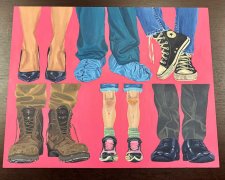2023 Law Day Art & Essay Contest Winners
Cornerstones of Democracy
What is the role of education and my teacher in making a successful government? I think it is teaching social skills, how to take care of responsibilities, and having expectations. These are what teachers should be teaching us to do in making a successful government.
In making a successful government I think that the teacher should teach us social skills. In a government you normally have to talk to people to sort out problems. A teacher should also teach about having responsibilities. In a government, having responsibilities is super important. If you don't follow your responsibilities you will get fired! Finally,! think that a teacher should teach us to have expectations. I think that teachers should teach their students to have expectations because In a successful government having expectations is a big deal. If you don't have expectations no one would ever get anything done!
Those reasons are why I think that teachers should teach us to have social skills for talking to others peacefully. Also, to have responsibilities so that we can get the things done that we need to do. Lastly, to have expectations for the workers to get the job done.
Jack Cassidy
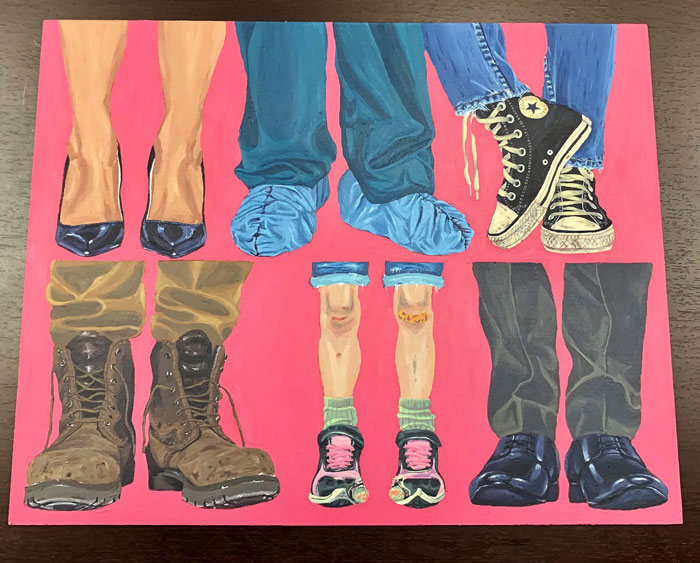
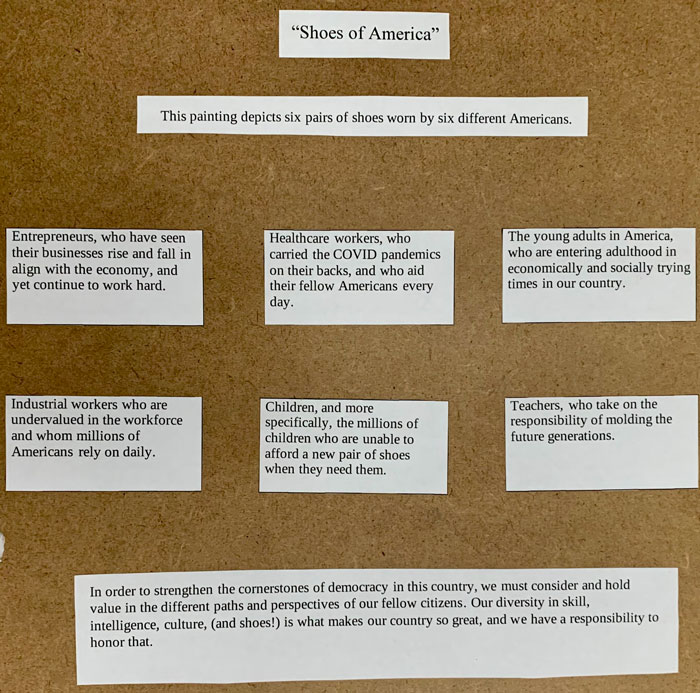
Kathryn Niklaus
Click for Lila Butters song
Lila Butters
Reward of Democracy
Three cornerstones, I need to think of one more
What will be number four?
Civics, Civility, and Collaboration
What will you do with such information?
Civics, the rights and duties of citizenship
Civility, politeness and respect
Collaboration, working with others,
What else would you expect?
The world is full of sadness and despair
Would harmony make it all fair?
It would be nice to have more understanding,
And even fewer demanding.
CONCORD
Concord, agreement or harmony between people or groups
The three cornerstones can’t stand alone
Democracy can’t be strengthened on its own
Living in concord Americans can accomplish more
Concord is what you should be looking for
Without concord our democracy can fall apart at the seams
Could you tell me what that means?
Students should know about concord
Teachers should be able to get them onboard
A successful democracy shall be the reward.
Benjamin Turri
Education and your teacher are essential in making a successful government. There are eight social skills that children need to know to be positive role models in the classroom and in their community. The eight social skills are: sharing, listening, following directions, collaborating and cooperating, patience, empathy, respecting boundaries, and positivity. Teachers must understand each student individually and what they need to work to their full potential. A teacher who shows kindness and makes the student feel comfortable will positively influence how a student behaves. The student will want to be successful and take pride in the eight social skills their teacher instills in them.
Now, how does this relate to the government? The social skills you need to know as a child in school go hand in hand with the social skills you need as an adult to succeed in the workplace. These workplace social skills are communication, organization, critical thinking, active listening, self-care, cultural awareness, patience, and understanding. For example, to be a representative in Congress, you need to have patience to wait your tum to speak to your fellow members of Congress. As a judge, you must have critical thinking skills to be impartial when listening to a case representing the plaintiff and the defendant.
These skills are crucial to having a successful government. These same skills are imperative for the people of the United States to abide by to have a functioning and safe democracy. Education and my teacher play an essential role in making a successful government.
Dollie Kuri
How Does the Media Promote or Inhibit Civility in Our Society?
To be persuasive we must be believable; to be believable we must be credible; to be credible we
must be truthful. -Edward R. Murrow
With great power comes great responsibility. -Uncle Ben to Peter Parker (Spiderman)
The media is not just important; it is critical to the success of our democracy. Mediaengement.org describes media as the "fourth pillar of democracy along with judiciary, executive and legislature" whose role is to "act against the injustice, oppression, misdeeds and partiality of our society and act as a watchdog to protect public interest against malpractice through public awareness."
But it is clear that public trust in the media is near an all time low. A 2022 Gallup Poll showed that only 34% of Americans trust the media to report news "fully, accurately and fairly," and only 7% have "a great deal" of trust and confidence. This is just two points higher than the lowest ever rating which came during the 2016 presidential campaign. While it might be easy for some to blame these feelings on recent political issues (such as gun control/school shootings, vaccinations, critical race theory, book banning, overturning Roe v. Wade, etc.), the reality is that trust in the media has been slipping since 1976. 1976 happened to be the first presidential election year after the Watergate Investigation that was prominently played out in the Washington Post and other newspapers. I do believe that much of this distrust in the media has been exacerbated more recently by the widespread incivility we are seeing in the media, predominantly on television, through talk radio, and online via social media.
The purpose of media (according to a recent article in Medium) is best defined by the roles they play in society: to educate, inform and entertain through news, features, and analysis in the press. However, not all media lives up to this calling and some actively work against it. From my perspective, these media outlets promote incivility and have sacrificed education and information for revenue and viewership. It is no wonder that the media feeds into a cycle of incivility by using the aggressive promotion of counter viewpoints through disrespectful arguments, posts or commentary that are incendiary and mean-spirited, and opportunities for anonymous comments or responses.
It is important, though, to understand that while the media plays a hand in the civility of our society, the citizenry is equally as responsible. The media is simultaneously a role model for and mirror to our society. As media becomes less civil, that prompts viewers to be less civil, then the media coverage of our society appears even less civil, and it continues in this vicious cycle. Trust and incivility seem to have an inversely proportional relationship. As trust in the media goes down, incivility within the media seems to be increasing.
I saw this spiral play out first-hand in the school board meetings in my district. While the mainstream media seemed consistent in reporting the potential impact of COVID-19; the growing transmission rates, the health implications, and the benefits of masking, there emerged a clear lack of trust in what the media was saying. And this distrust was often fueled by other "media'' outlets. At one of these meetings, I heard the mother of a child with a chronic disease, sobbing at a podium, begging the administration to keep her family safe. The next father to speak began with, "I don't care about any other children in the school district except my own." Neighbors were yelling at one-another, and people called our elected officials un-American and compared them with the Nazi Gestapo. Watching this unfold solidified for me how a lack of trust in the media can lead to increased incivility. I could tell these people were not acting this way on their own. They were mimicking phrases and statements they heard through the media. I watched a health and safety issue unfold into a vitriolic, political one fueled by segments of the media.
It is human nature that we favor information that confirms our existing beliefs. This confirmation bias leads us to believe everything we see or hear that validates our preexisting beliefs and opinions and to distrust anyone or anything that challenges these prejudices. At no time in my research did I read that the purpose of the media was to tell us what we "wanted to hear."
When thinking about the cornerstones of our democracy; civics, civility, and collaboration, I kept thinking that "consideration" would be a great fourth cornerstone. It is defined as "careful thought, typically over a period of time, deliberation, thoughtfulness for other people, consideration before acting." How much more civil would both our media and society be with more consideration.
In order for our democracy to survive and thrive, media needs to fulfill their original intent and promote civil discourse. But, it is unrealistic that all media outlets will take the high road. So it is also important that citizens need to seek out reliable media sources to understand all legitimate facets of an issue. When the public begins to trust common news outlets as a reliable source of information that presents valid disagreements civilly, only then will our country be able to come together to work towards a common goal of bettering our democracy.
Emma Strickland
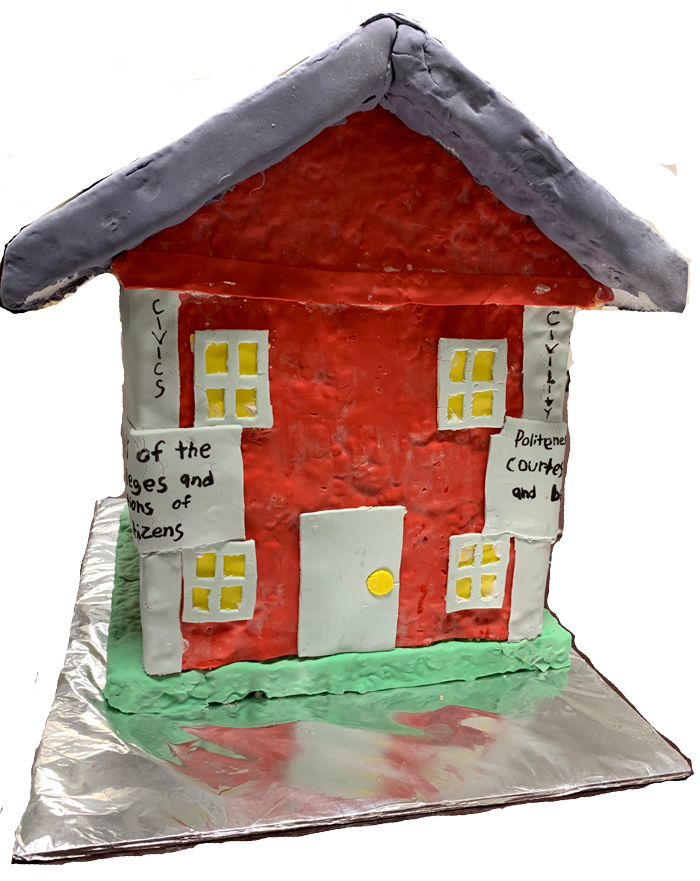
Isabella Newcomer
The 4th Cornerstone of Democracy
The cornerstones of democracy are civics, civility, and collaboration. These three cornerstones of democracy are things that we need to support our country, but a 4th cornerstone would make our democracy even more stable. The 4th cornerstone would be, in my opinion, the Constitution.
The Constitution would be the 4th cornerstone of democracy because it was written “for the people, by the people”. Our founding fathers helped with writing it. The,” for the people” part displays the civics part, and the,” by the people” part illustrates the collaboration that they used to write the Constitution. To collaborate effectively, they needed to do it civilly. This shows that the Constitution was made to be a plan for how the United States would work.
The Constitution helps to protect peoples’ freedoms and rights. The First Amendment protects our ability to have free speech, freedom of religion, and assemble peacefully. The Fourth Amendment protects our right to be secure in our homes. The Sixth Amendment protects our right to have a fair trial.
Our country’s laws are supposed to support the Constitution and how it works. This shows the importance of the Constitution. In conclusion, I think that the Constitution would be an appropriate 4th cornerstone of democracy considering the reasons above.
Gwendolyn Eisley
Henry David Thoreau implores us to think of the government as a machine. One that is able to organize projects and provide liberties that no other force could, but also one that can get ahead of itself. One that becomes deaf to the wishes of the people and creates its own goals to work for. At this point, when the traditional cornerstones of democracy become toothless, Thoreau advocates for another process he believes is equally essential to democracy - civil disobedience.
Thoreau’s claim is far from an outlandish one. It is, instead, well rooted in American history. The Boston Tea Party comes to mind as an early example. In response to the taxation without representation of the Tea Acts, the colonists threw 92,000 pounds of tea into the Boston Harbor. The foundational importance of Civil Disobedience does not end there, though.
As the dust of the revolution settled, the founding fathers struggled to reconcile that a nation born in rebellion would now have to govern. Thomas Jefferson was keenly aware of the ironic turn that this could take and expounded at length on the right of Americans to rebel against their government. Harris G Mirkin, a professor of politics at the University of Missouri Kansas City, writes, “Jefferson thought of rebellion as an element in forcing a moral decision rather than a weapon designed to conquer. Rebellion had a juridical role and the rebels were, in effect, presenting their case to the remainder of society which Jefferson envisioned as a vast Court.” Thus, action against the government was cemented as an integral part of the American democratic tradition.
When Thoreau wrote his famous polemic on civil disobedience, many people, Thoreau included, were reviled by the horrors of slavery and the irrational violence of imperialism in the Mexican-American War. These issues faded from the forefront, but Thoreau’s emotional conviction against being complicit in government injustice would carry on when a young Martin Luther King read his essay. With King, the importance of civil disobedience as a democratic process was made plainly clear. Without the power to vote, King still managed to make the voices of millions of Americans heard in their fight against the injustices of institutional racism. The protests and marches of the 1960s civil rights movement improved the functionality of American democracy, stopping the machine and changing its course before it ran towards destruction, as it had when America stood divided.
Civics, civility, and collaboration have given America many of its strengths. They have given America the strength and prosperity that it enjoys in the modern day. But these three cornerstones can find themselves used in the name of unjust majority rule; a 51% seeking to terrorize a 49%. When the machine runs on in spite of the wounds it inflicts, Thoreau gives us the advice; “Cast your whole vote, not a strip of paper merely, but your whole influence. A Minority is powerless while it conforms to the majority; it is not even a minority then; but it is irresistible when it clogs by its whole weight.”
Luke O'Brien
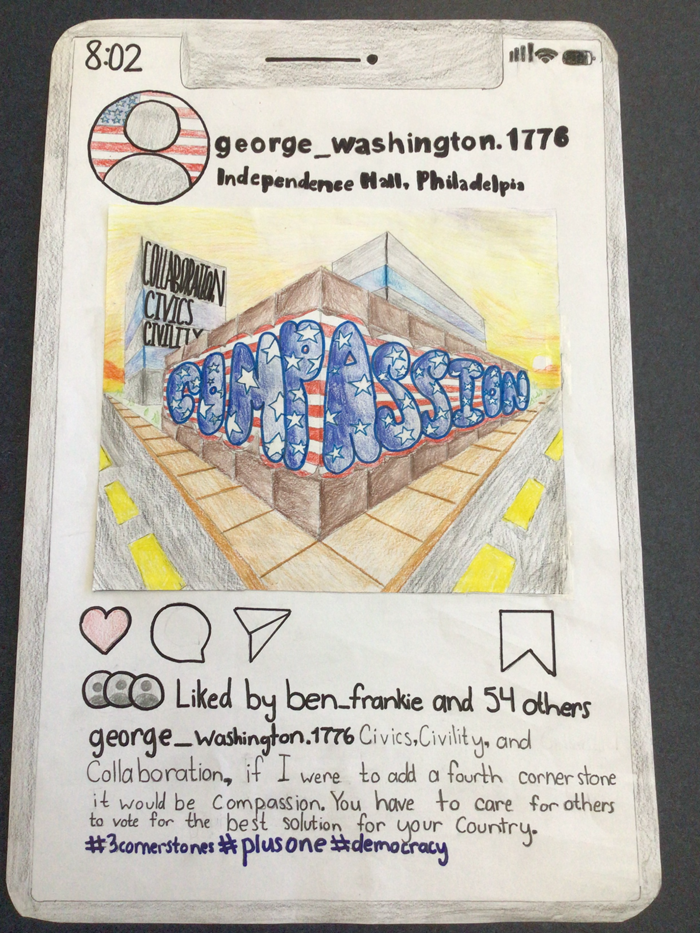
Karlee Brouse
Communication: The Fourth Cornerstone of Democracy
According to a study performed by Pew Research Center in 2022, six-in-ten U.S. adults are unsatisfied with the way democracy has been functioning in America, and 85% agree that the U.S. political system either needs major changes or complete reformation. The data indicates that citizens believe the structure of democracy is to blame for a failing democratic system, but Americans rarely consider the root cause to be themselves. For example, NPR News reported that only 67% of eligible voters voted in the 2020 presidential election, demonstrating how U.S. citizens are failing to act upon the cornerstones of democracy of civics, civility, and collaboration. Democracy fails when Americans are reluctant to abide to these three cornerstones. The most approachable stance to prevent U.S. citizens from abandoning these fundamental standards is to stress how vital proper communication is in a democracy. Its importance is so crucial that it deserves to be recognized as a fourth cornerstone, and, when utilized correctly, would improve the democratic relationship between the people and the government. Although civics, civility, and collaboration are strong cornerstones in solidarity, an additional cornerstone of communication would greatly reinforce the existing democratic qualities.
In order for any cornerstone to prosper, the three others must be present, for each of the cornerstones both support and depend on one another. Communication properly demonstrates this ability with both civics and collaboration. With the help of major communication outlets, or mass media, Americans can effectively execute their civic duties by participating in democratic processes, respecting and obeying the law, staying informed, participating in local community events, paying taxes, and serving on a jury. Televised news stations, newspapers, radio broadcasts, and other forms of mass media are great sources of information to assist citizens in executing these duties, especially concerning staying informed. This is an essential responsibility for U.S. citizens because it helps them vote honestly, acknowledge events in the world around them, and make educated decisions. Additionally, utilizing an accurate, reliable, and honest source of mass media is just as important as any other civic obligation in the United States. It can be difficult to identify undependable media, therefore Americans should be careful in which sources they trust. Accessing valid communication allows citizens to participate in an array of civic duties.
Likewise, successful collaboration requires respect, reliability, and most importantly, communication. Whether it be a local problem or nation-wide dilemma, disscussion is necessary to reach a resolution. In recent years, political division has become much more prevalent. For instance, a physical and threatening exchange occurred between Republican congressmen during what should have been a respectful election process. Furthermore, the war between Democrats and Republicans has expanded beyond peaceful protests into genuine violence, turning common Americans against each other. Proper collaboration will allow Americans to overcome their differences and become further united, preventing aggressive altercations. Learning to compromise, empathize, and understand other perspectives will ultimately create a safe and respectful environment in which different political parties can collaborate. Accomplishing appropriate collaboration amongst American citizens would be vain, though, without the use of communication since the democratic cornerstones rely on each other so greatly.
In contradiction, strong evidence suggests that certain communication sources, particularly social media, are in fact promoting a lack of civility in Americans. A second study done by Pew Research Center in 2022 shows 69% of U.S. adults agree that social media has made people less civil in the way they talk about politics. This could be caused partly by certain features providing anonymity to users. It can be difficult to identify a user who provides no personal information, so social media users feel they can safely use rude or threatening dialogue online and receive no repercussions. As a result, social media has become a support system for harsh debates, chaotic arguments, and disrespectful behavior.
Even so, it is important to address that no institution can succeed without the presence of every cornerstone, for each one both aides and relies on the presence of one another. Any form of democracy would, in theory, collapse without the company of all four. This reality has unfolded regarding social media, where users are neglecting the standards of all cornerstones. As stated before, mass media is being abused, with untrustworthy cites relaying faulty information, preventing citizens from accomplishing their civic responsibilities. Along with this, politicians are losing touch with the idea of collaboration and are resorting to stubbornness rather than compromise. If Americans can return to practicing adequate communication, a better functioning democracy may lie on the horizon. Not only this, but U.S. citizens could prevent democratic downfall by practicing all four cornerstones of democracy: civics, civility, collaboration, and communication. By respecting others, working together, fulfilling responsibilities, and communicating efficiently, Americans can improve both their society and country.
Olivia Regan

